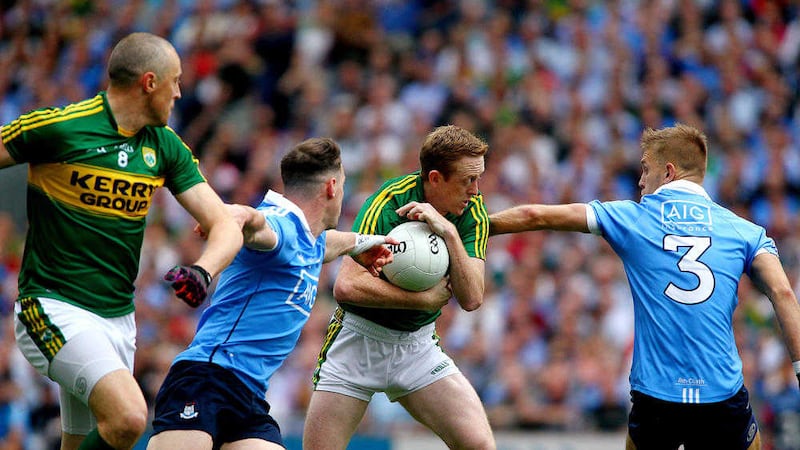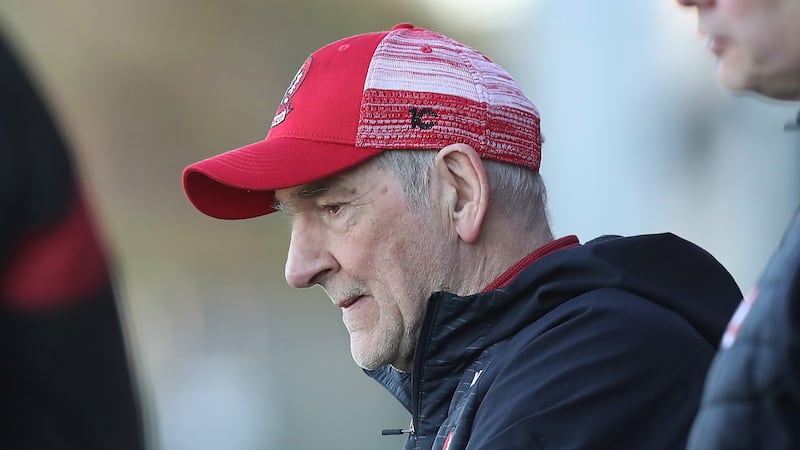IN THE end, Kerry blinked. They met Dublin’s gaze for 66 minutes, held strong and then they blinked.
Eamonn Fitzmaurice’s perception of where the Dubs’ weaknesses lay was on the money. Some of them were exploited. Others, they weren’t quite able to, but you could see the plans had been laid.
Tactically, this was almost the Kerry manager’s finest display. So much of what he laid down surpassed the mimicry of Donegal in 2014 that won them an All-Ireland.
There was a huge element of risk-taking involved. No better example than the first goal. We’ve heard of a full press on Stephen Cluxton’s kick-out before, but this was like nothing that had been seen.
As Colm Cooper slotted over the free that brought Kerry back to within three points at 0-9 to 0-6, they had already made their move. It was clearly pre-rehearsed as two Kerry half-backs abandoned their station to push right into the Dublin half and outnumber the Dubs. It left two Dublin forwards standing free inside Kerry’s 45.
Cluxton thrives on space. He thrives on runners. When he looked up, he had neither. The Kerry forwards, too, were dancing a jig in front of him, every one of them jumping side-to-side, frantically waving their arms.
When you take risks like that, you’d need to get the rewards. And boy did it work. Paul Geaney created the illusion of a free man by standing inside John Small, making Cluxton think he wasn’t tight. But the second the left foot went near the ball, Geaney sprinted into the one space he knew the ball would go into.
From there, they were clinical. The long delay on the restart allowed Kerry to stay in that press and Cluxton put the next kick-out over the sideline.
When asked after the game why they hadn’t persisted with the tactic of pushing up like that, Fitzmaurice made the valid point they were only able to do it after a free and they hadn’t been given any in the second-half.
There were elements that didn’t work as they would have hoped, most notably the pairing of Anthony Maher and David Moran at midfield. They plucked a few balls, but not as many as they would have hoped. Kerry’s half-back line were all making runs looking for a short ball off Brian Kelly and, as such, Dublin had numbers beneath almost every break that came off the Kerry midfield pair.
The key for Kerry, though, was their use of Kieran Donaghy. He went straight into full-forward but, much like Aidan O’Shea’s been doing lately for Mayo, he dipped in and out of the position.
When he was in, Kerry kicked very little ball at him. One or two just. But that was enough. Enough that Philly McMahon needed to stay on him and enough that his movement was pulling Cian O’Sullivan out of the middle.
He made his runs down the middle, out past O’Sullivan and distracted the Dublin sweeper, who went out with him. Then, Kerry kicked it over their heads towards Colm Cooper and Paul Geaney.
Granted, Jonny Cooper won a fair bit of that early ball but, once Kerry found the measure of it, it threatened to be a deadly tactic. They would have had a goal off it for Donnchadh Walsh in the opening few minutes, only for Davy Byrne getting across to meet him with a brilliantly timed shoulder to turn him away when he looked certain to score.
Donaghy’s presence tied up McMahon and O’Sullivan and offered Kerry the same variation in attack that took Mayo past Tyrone in the quarter-final.
Those two games suggest Gaelic football is starting to turn its back on the overt defensiveness that’s taken a grip of the game since 2011. It was a joy to see two teams that loaded men behind the ball for a reason other than damage limitation. They defended smartly, but they attacked brilliantly as well.
That is the most neglected thing of all in Gaelic football. Modern coaches spend hours upon hours teaching players how to tackle, how to position themselves defensively and building the fitness so they can work back. But for five years now, from the bottom almost the whole way to the top, attacking play has been woefully neglected and structureless.
Dublin have always varied their attack and that’s why they’ve been the best team in the land in those five years. Jim Gavin is blessed with the attacking riches he has at his disposal, but they don’t get anywhere near enough credit for the manner in which they use them.
They mixed the kick to Bernard Brogan and Dean Rock with the running game from deep and, ultimately, in spite of a few big decisions that went their way, Dublin were a better team than Kerry last Sunday.
The Kingdom, though, were the first team to face the Dubs this summer who were truly brave enough to take them on. That’s why Mayo have given them their fill of it over the last five years as well because they’ve never been afraid to have a go.
The reality is finally dawning that you will not beat them simply by putting 15 men inside your own half and hoping for an off-day from the Dublin forwards.
Kerry’s bravery last Sunday lasted for 66 minutes, until they withdrew our man of the match Paul Geaney and put on Marc Ó Sé. Fitzmaurice said afterwards Dublin had pushed right up on Kerry’s sweeper and he needed another defender on in order to reestablish that system.
It was exactly like Waterford’s decision to go away from the man-for-man approach that had Kilkenny half-beaten in the All-Ireland hurling semi-final earlier this month. An underdog that just lacked that little tiny bit of courage in its conviction to go and finish the job.
When Dublin went ahead late on, Kerry found themselves with nobody in the full-forward line on their last two attacks. Donaghy had gone off injured and, with Geaney withdrawn, James O’Donoghue was far too deep.
It was the first backward step they’d taken all afternoon, but it was enough to undo all of their good work. It’s hard to hold it against them, but those were the margins in such a titanic tussle.
It will be a sore lesson for Kerry to learn, but Mayo can be the first to take heed. They’ve used Aidan O’Shea in a similar manner to Donaghy of late. They are a very similar team to Kerry in that they have a very big middle-third and energy elsewhere.
If Stephen Rochford isn’t too proud to steal ideas off Fitzmaurice, then he may just have seen the template for success in three weeks. Counties and clubs the length and breadth of Ireland will also have taken note.
Kerry might not have won last Sunday, but they may well have done a great service to Gaelic football with their performance.









